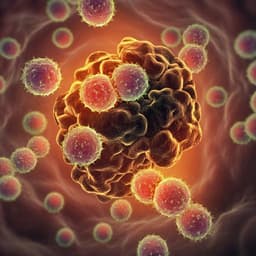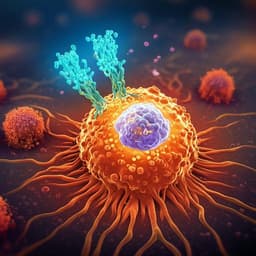
Medicine and Health
Adapter CAR T cells to counteract T-cell exhaustion and enable flexible targeting in AML
D. Nixdorf, M. Sponheimer, et al.
CAR T-cell therapy has transformed outcomes in B-cell malignancies but translation to AML has been hindered by the lack of leukemia-restricted antigens, antigen heterogeneity, safety concerns (CRS, ICANS, hematotoxicity), and T-cell dysfunction/exhaustion. The study aims to optimize an adapter CAR (AdCAR) T-cell platform that decouples antigen recognition from T-cell activation via low-molecular-weight, biotin-binding adapter molecules, enabling flexible, switchable, and sequential targeting of multiple AML-associated antigens (CD33, CD123, CLL-1). The central hypotheses are: (1) AdCAR T cells can be redirected to multiple AML targets to overcome antigen heterogeneity and potential escape; (2) adapter molecule (AM) pharmacodynamics, including target-mediated internalization, influence AdCAR efficacy; and (3) intermittent exposure (treatment-free intervals, TFIs) enabled by short AM half-lives can mitigate continuous stimulation–induced AdCAR T-cell dysfunction, preserving function over time. The purpose is to demonstrate specificity, efficacy, and controllability of AdCARs in AML models and to define strategies to counteract exhaustion while maintaining safety through tunable activation.
The manuscript situates the work within challenges of AML immunotherapy: existing CAR T efforts targeting CD123, CD33, or dual targets show limited benefit and safety concerns, with high-grade CRS and hematotoxicity reported. Antigen escape in B-cell malignancies (CD19/CD20/CD22) suggests similar risks in AML, intensifying the need for flexible, multi-antigen strategies without manufacturing multiple CAR products. Prior studies show T-cell dysfunction in AML patients and that transient rest can restore CAR T function via epigenetic remodeling. Low-molecular-weight adapters may mitigate CRS and offer on–off control. Collectively, literature supports developing modular, controllable CAR platforms addressing antigen heterogeneity and exhaustion in AML.
- In vitro cytotoxicity assays: Human donor AdCAR T cells or untransduced (mock) T cells were co-cultured with AML cell lines MV4-11, HL-60, or OCI-AML-3 at varying effector:target (E:T) ratios in the presence of target-specific AMs (CD33, CD123, CLL-1) or a control AM (CD19). Specific lysis was assessed by flow cytometry (CytExpert SLX, Beckman Coulter). Cytokines (IFN-γ, TNF, IL-2) were measured by bead array.
- Primary AML (pAML) long-term co-culture: pAML cells were cultured in long-term assays. For serial targeting, AMs were replenished or exchanged every 3 days by replacing 500 µL culture medium with 2× complete medium containing AMs. Sequential use of AMs (CD33, CD123, CLL-1) and dose escalation (10 to 100 ng/mL) were tested.
- Internalization assays: CD33-AMab was labeled with pHrodo Red Avidin to visualize endocytosis. AML cells were incubated with 500 ng/mL labeled AM at 4 °C, washed, then incubated at 4 °C or 37 °C for up to 6 h on coated imaging plates. Confocal microscopy (Nikon TiE) visualized internalized puncta. An indirect internalization assay quantified surface-retained AMs by flow cytometry after incubation at 37 °C with or without prior removal of unbound AM, comparing median fluorescence intensity over time. Internalization kinetics of Fab- versus Ab-format AMs were compared across AML lines.
- Long-term AdCAR T-cell stimulation and TFIs: Healthy donor AdCAR T cells were co-cultured with irradiated OCI-AML-3 cells in the presence of CD33-AMab. Cells were restimulated with fresh irradiated targets and AM as per schedule to model continuous (CONT) versus intermittent stimulation with treatment-free intervals (TFIs). T cells were periodically isolated (days 0, 7, 10, 14, 17, 21) for cytotoxicity, proliferation, cytokine secretion, granzyme B expression, and immunophenotyping.
- Transcriptomics: RNA-seq was performed on AdCAR T cells from CONT and TFI conditions at days 0, 14, and 21. Differential expression analysis, pathway analysis (Hallmark, GSEA), and gene-set comparisons were conducted to assess transcriptional reprogramming.
- In vivo studies: NSG (NOD.scid.IL2Rγnull) mice were engrafted via tail vein with OCI-AML-2 leukemia cells (day −5). On day 0, mice received AdCAR T cells or conventional second-generation CD33 CAR T cells. CD33-AMab was administered intraperitoneally daily. Leukemia burden was monitored by bioluminescence imaging twice weekly. Animal health was monitored per FELASA guidelines.
- Target antigen heterogeneity: Among 32 primary AML (pAML) samples at diagnosis, most expressed CD33, CD123, and/or CLL-1 at high levels, but some samples showed subpopulations with limited expression, underscoring the need for flexible multi-targeting.
- Efficient AdCAR generation: Lentiviral AdCAR transduction was consistent and efficient (55% ± 5% SEM). CD4+ T cells were more susceptible to transduction than CD8+ T cells.
- Specific cytotoxicity and activation: AdCAR T cells mediated specific lysis of AML cell lines (MV4-11, HL-60, OCI-AML-3) only in the presence of target-matched AMs; no off-target cytotoxicity with control CD19 AM. Cytokine release (IFN-γ, TNF, IL-2) occurred only with target-specific AMs.
- AM internalization and antigen sink: Surface-bound CD33-AMab declined almost completely within 72 h on MV4-11; removal of unbound AM accelerated loss, indicating receptor-mediated endocytosis with limited rebinding to recycled receptors. pHrodo imaging confirmed rapid internalization at 37 °C. Fab AMs had shorter surface half-lives than Ab formats; after 6 h, only approximately 19% (αCD33-AMFab), 8% (αCD123-AMFab), and 8% (αCLL1-AMFab) remained on the surface. Flow cytometry–based kinetics showed half-lives (min) for AMs (examples): mCD33-AmAb 127 (MV4-11) vs 63 (OCI-AML-3); mCD123-AmAb 56 vs 73; CLL-1-AmAb 66 vs 73. Internalization contributed to reduced AM availability and impaired AdCAR cytotoxicity, especially at low antigen density (OCI-AML-3), where 12 h pre-incubation led to marked loss of killing despite initial AM levels.
- Primary AML efficacy and sequential targeting: AdCAR T cells efficiently lysed pAML in co-culture. Long-term cultures showed that single AM dosing lost efficacy over time, but periodic AM replenishment, dose escalation (10 to 100 ng/mL), or switching AM specificity (CD33 to CD123 or CLL-1) restored and enhanced cytotoxicity. Serial use of different AMs effectively eliminated pAML cells.
- In vivo efficacy: In NSG mice engrafted with OCI-AML-2 leukemia, Fab-based CD33 AMs effectively directed AdCAR T cells to control leukemia burden, with performance comparable to conventional CD33 CAR T cells by bioluminescence imaging.
- Exhaustion dynamics and TFIs: Continuous stimulation induced progressive AdCAR T-cell dysfunction (specific lysis against OCI-AML-3 declined from 82% on day 0 to 13% by day 21). Implementing TFIs improved function: specific lysis (mean ± SEM) increased versus continuous stimulation (day 14: 64% vs 43%; day 17: 60% vs 36%). Intermittent exposure enhanced proliferation, IL-2 secretion, granzyme B production, and expression of activation/exhaustion markers (PD1, LAG-3), without differences in AdCAR surface expression.
- Transcriptional reprogramming with TFIs: At day 14, TFI versus CONT AdCAR T cells showed 115 upregulated and 219 downregulated DEGs (p < 0.01) with distinct clustering. TFI associated with downregulation of cell-cycle and metabolic pathways (e.g., G2M checkpoint NES −2.31; M phase NES −2.74; OXPHOS NES −2.28; glycolysis NES −2.04; p < 0.05) and a shift toward effector-related signatures (GS9360, NES −2.41, FDR 0.00). By day 21, some cell-cycle/activation genes re-expressed in TFI-treated cells (e.g., CDK1, IL2RA), suggesting partial rejuvenation and greater potential for reactivation compared to CONT, though not fully returning to day 0 levels.
The AdCAR platform directly addresses AML’s antigen heterogeneity and safety challenges by decoupling targeting from activation, enabling modular, tunable engagement of multiple antigens (CD33, CD123, CLL-1) either sequentially or in combination. Demonstrated in AML cell lines, primary AML co-cultures, and an in vivo model, AdCAR T cells achieved antigen-specific cytotoxicity and cytokine release comparable to conventional CARs while offering control via AM dosing and switching. The discovery that target-mediated AM internalization creates an antigen sink elucidates a key pharmacologic factor limiting efficacy, particularly at low antigen density; this insight guides dosing strategies (replenishment, dose increase, target switching) to sustain killing. Continuous stimulation induced dysfunction, but TFIs, facilitated by the short half-lives of Fab AMs, restored function and promoted transcriptional states associated with improved effector potential, supporting the hypothesis that intermittent activation mitigates exhaustion. Together, these findings suggest AdCARs can maintain efficacy while potentially improving safety through controllable activation, positioning the platform as a promising approach for relapsed/refractory AML and adaptable to other myeloid malignancies.
This study establishes a potent, flexible AdCAR T-cell platform for AML that: (1) enables multi-antigen targeting (CD33, CD123, CLL-1) with switchable adapter molecules; (2) sustains efficacy against AML cell lines and primary AML, including through serial AM switching and dose modulation; (3) reveals target-mediated AM internalization as a key determinant of AM availability and AdCAR efficacy; and (4) demonstrates that treatment-free intervals enabled by short-lived Fab AMs counteract exhaustion and reprogram AdCAR T cells toward improved function. These data support early clinical translation of AdCARs in relapsed/refractory AML. Future work should optimize AM dosing schedules accounting for internalization, evaluate combination or simultaneous multi-targeting regimens, refine manufacturing to preserve naive-like T-cell phenotypes, and test safety and hematopoietic recovery during TFIs in clinical settings.
- The superiority observed with AM switching may reflect intrinsic differences in AM potency or pharmacology, not solely re-targeting effects.
- Internalization kinetics were assessed in vitro/ex vivo; systemic pharmacokinetics and tissue distribution in vivo may yield additional clearance pathways (e.g., renal clearance for low-molecular-weight AMs), and AM dissociation cannot be excluded.
- Models used cell lines, ex vivo pAML co-cultures, and an NSG xenograft; human immune microenvironment and on-target hematotoxicity cannot be fully assessed.
- Exhaustion reversal with TFIs was partial; transcriptional and functional restoration did not return to baseline, indicating residual dysfunction.
- Antigen expression heterogeneity across broader AML subtypes and during disease evolution was not fully characterized; durability of control with long-term sequential targeting remains to be proven clinically.
- Safety (CRS, ICANS, myelosuppression) was not evaluated in patients; optimal clinical dosing and scheduling of AMs require further study.
Related Publications
Explore these studies to deepen your understanding of the subject.







